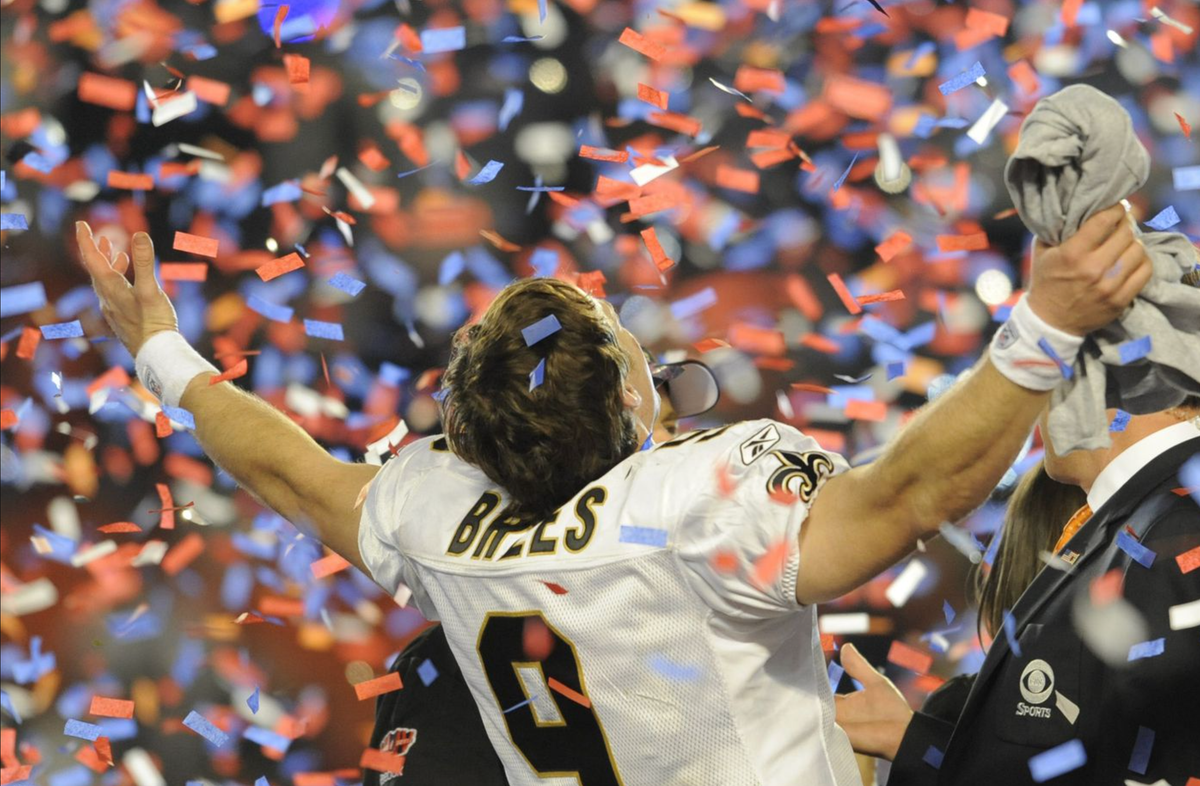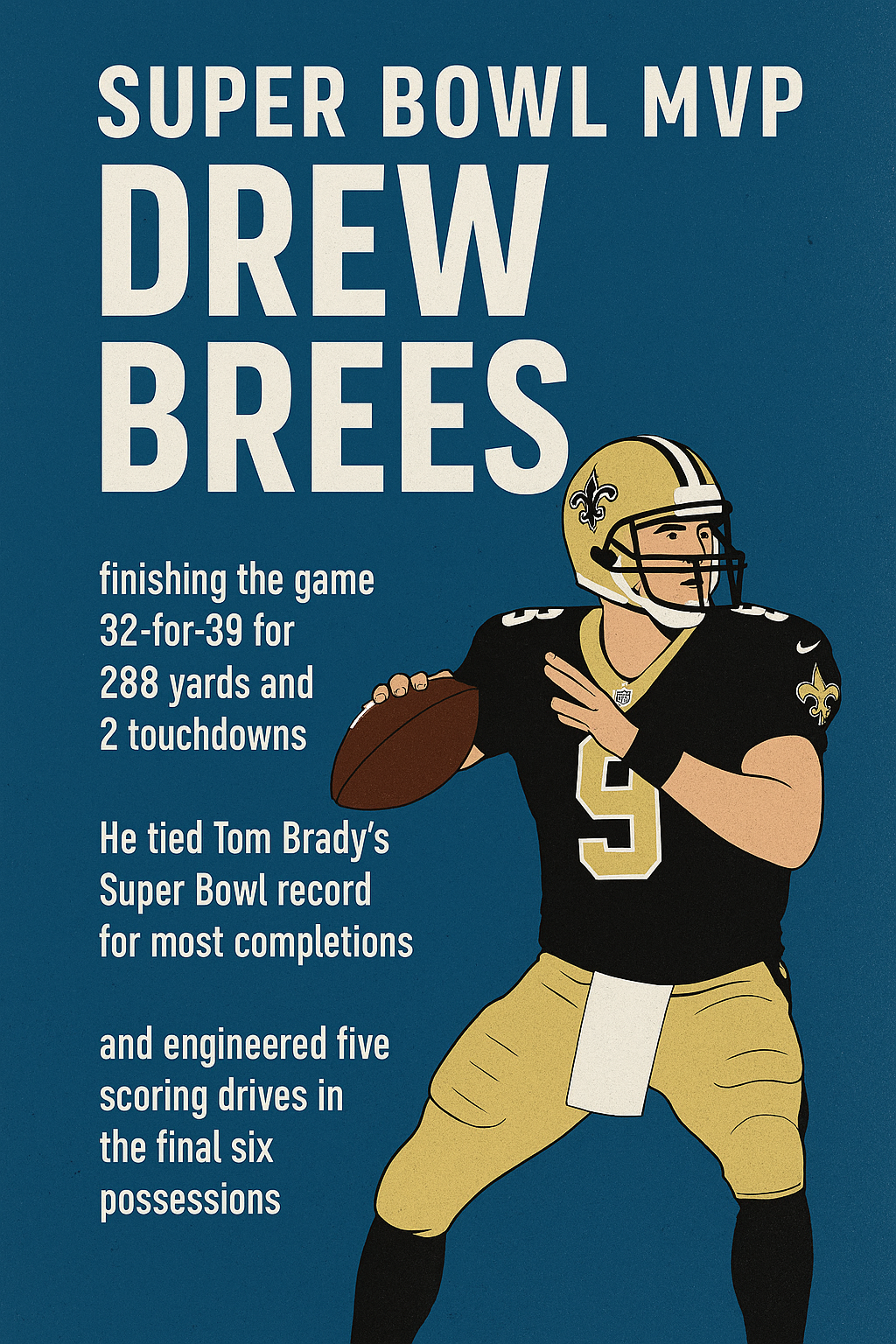Super Bowl XLIV: The Saints Go Marching In – A Legacy-Defining Victory

February 7, 2010. It wasn’t just the day the New Orleans Saints won their first championship—it was the day an entire city exhaled. In Super Bowl XLIV, held at Sun Life Stadium in Miami Gardens, Florida, the Saints stunned the football world by defeating the Indianapolis Colts 31–17, in a comeback win filled with daring play-calling, a second-half ambush, and a heroic quarterback performance.
This wasn’t just a win for the franchise. It was a cultural catharsis. In the wake of Hurricane Katrina, New Orleans had rebuilt not just buildings but belief. And on that humid Florida night, belief turned into history.
The Stakes
The Colts, led by four-time MVP Peyton Manning, were 14–2 in the regular season and already champions of Super Bowl XLI. They were the odds-on favorite. They had the experience, the pedigree, and the star power.
The Saints, by contrast, were the feel-good story of the NFL—led by head coach Sean Payton, quarterback Drew Brees, and fueled by a city still recovering from catastrophe. They were the underdogs, but they had swagger—and an offense that led the NFL in scoring.
“This game wasn’t about numbers,” said James DeVito, historian at the Super Bowl Historical Society. “It was about hope. The Saints weren’t just playing for a trophy. They were playing for New Orleans.”
A Sluggish Start
The first quarter went predictably. The Colts marched down the field with surgical precision. Manning connected with Pierre Garçon for a 19-yard touchdown, and the Saints looked a step slow. New Orleans would add just a field goal in the first half, and by the second quarter, they trailed 10–6.
But something was brewing. Despite the score, the Saints had outgained the Colts in total yards. Brees began to find a rhythm, using quick reads to neutralize the Colts’ pass rush. With 11 completions to 8 different receivers in the first half alone, he showed the poise that would come to define the night.
The Onside Kick Heard Round the World
Sean Payton had already made up his mind by halftime.
To begin the second half, the Saints executed “Ambush”—an onside kick that blindsided the Colts and flipped the game’s energy. It was risky. It was bold. And it worked. The Saints recovered.
“It was the gutsiest call in Super Bowl history,” said Dr. Lawrence Hayden, senior archivist at the Super Bowl Historical Society. “It changed everything. It told the world: We’re not here to survive. We’re here to win.”
Brees then marched the Saints down the field, culminating in a 16-yard touchdown run by Pierre Thomas, giving New Orleans their first lead of the game, 13–10.
Brees vs. Manning: The Duel
Manning answered back in the third with a touchdown pass to Joseph Addai, reclaiming a 17–13 lead. But it wouldn’t last. Brees, methodical and unshaken, put together another drive capped off by a Jeremy Shockey touchdown reception. The Saints, after a successful two-point conversion, led 24–17.
The game remained within one score. Manning, ever the technician, looked poised to do what he’d done countless times—engineer a game-tying or game-winning drive. But destiny had other plans.
Tracy Porter Seals the Deal
With under four minutes left, Manning dropped back on a crucial third down. He fired a quick out route intended for Reggie Wayne—but Tracy Porter, the Saints’ defensive back, had studied the film.
He jumped the route.
The ball hit Porter in stride, and he raced 74 yards untouched for a touchdown. 31–17. Colts fans stood in disbelief. Saints fans cried tears of joy.
“Porter’s pick was more than a play—it was poetry,” said DeVito. “It was the moment generations of Saints fans had waited for.”
Brees’s MVP Performance
Drew Brees was named Super Bowl MVP, finishing the game 32-for-39 for 288 yards and 2 touchdowns. He tied Tom Brady’s Super Bowl record for most completions and engineered five scoring drives in the final six possessions.
He didn’t just win the game—he outdueled one of the greatest quarterbacks of all time on the biggest stage imaginable.
What made Brees so effective wasn’t arm strength—it was decision-making. He found Marques Colston, Lance Moore, Robert Meachem, and Devery Henderson in key moments, refusing to force the ball and letting the offense work methodically.

Legacy and Impact
Super Bowl XLIV wasn’t just a win—it was a statement.
For the Saints, it validated years of struggle. This was a team that had been the laughingstock of the NFL in the 1980s and 1990s—known more for “Aints” bags on fans’ heads than playoff success. The arrival of Brees and Payton in 2006 changed the franchise forever.
For New Orleans, it was a symbolic return to national prominence. Still recovering from Hurricane Katrina’s devastation five years earlier, the city used the Saints as a symbol of hope and recovery. The championship gave the people something to rally around—something no storm could wash away.
“This was a game that transcended football,” said Dr. Hayden. “It was civic pride wrapped in black and gold.”
Colts’ Missed Opportunity
For the Colts, Super Bowl XLIV was a bitter pill. Peyton Manning played well—he threw for 333 yards, 1 touchdown, and 1 interception—but the loss lingered. The onside kick, dropped passes, and the interception by Porter became what-ifs in an otherwise brilliant season.
The Colts never quite returned to the same heights. Injuries would plague the following seasons, and Manning would eventually be released in 2012, ending a historic chapter.
Stats Recap
- Final Score: Saints 31, Colts 17
- MVP: Drew Brees
- Passing Leaders:
- Brees: 32/39, 288 yards, 2 TDs
- Manning: 31/45, 333 yards, 1 TD, 1 INT
- Top Receivers:
- Marques Colston: 7 rec, 83 yds
- Dallas Clark: 7 rec, 86 yds
- Key Play: Tracy Porter’s 74-yard interception return TD
Postgame Reflections
The Saints returned to New Orleans as conquering heroes. A city-wide parade known as the Lombardi Gras brought hundreds of thousands into the streets. It was a party befitting a city that never needed much excuse to celebrate—but had every reason to.
For Sean Payton and Drew Brees, the win elevated them into NFL royalty. For the Saints organization, it erased decades of futility. For the people of New Orleans, it was an emotional triumph.
And for football fans everywhere, it was a reminder of why we love this game: the drama, the strategy, the heart, and the healing power of sport.
Conclusion
Super Bowl XLIV is etched into the annals of NFL lore not just because of the upset, or the thrilling pick-six, or even Brees’s masterclass performance. It’s remembered because it was meaningful—on and off the field.
In the words of Dr. Lawrence Hayden:
“Super Bowl XLIV wasn’t a Cinderella story. It was a story of grit, of vision, and of redemption. The Saints didn’t sneak in. They kicked the door down.”
